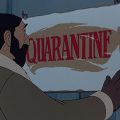Quarantine Control #55: We Made Materials

The situation with COVID-19 hasn’t changed much since the last Quarantine Control post, with vaccinations increasing, especially in the US, but cases growing worldwide thanks to people getting the wrong impression from relaxing restrictions — again. That more contagious variants are swirling around hasn’t helped. But the bigger news this week was the aversion of a disaster in particular for Black America, with Derek Chauvin being found guilty for murdering George Floyd last year. We all clearly saw what happened on the recorded footage, and the need for us to go through a long trial to have it affirmed and reaffirmed just to make sure says a lot about the US justice system and our society as a whole. Still, it’s at least some accountability.
Geoffrey Barnes
Hey, so I finally got around to a particular show.
His Dark Materials (2019)
Source: HBO Max
Episodes: 15 (The first two seasons)

It’s been nearly 15 years since I’ve read Philip Pullman’s His Dark Materials trilogy. Even then, I knew it was the kind of quality young adult series bound to receive some kind of adaptation. This was before I knew a movie adaptation of the first novel, The Golden Compass, was in the works even at that time, which starred big-name talent like Nicole Kidman, Eva Green, and Sam Elliott.
Despite its potential, it didn’t turn out well thanks to the staggering number of bad changes made, reportedly mandated by the execs. There was little chance of it getting another similarly-budgeted movie readaptation afterward, so a still-well-budgeted TV series from BBC and HBO was the best that could be asked for. The first two seasons, which adapt the first two books, are largely what the series deserved.
His Dark Materials starts off in a country that takes cues from the England in our world, but with differences that stand out. For starters, every human has their own daemons, animal friends that can talk to their hosts and others in the vicinity, along with talking and fighting bears and witches are wandering about. It’s not as technologically advanced as our world, to its benefit and detriment given how the story develops. The main character is Lyra Belaqua, a young girl who grew up an orphan with her daemon, Pan. She exhibited traits of being an adventurous type from the start of the show, a tease to the much longer adventure she actually experiences.
The show has an exposition-heavy start, dropping details about the school Lyra and her similarly orphaned friends attend at Oxford while running the viewer through what daemons and dust are, in addition to introducing a pile of characters. It’s overwhelming, especially for anyone who hasn’t read the novels beforehand. The TV series format allows for the producers to tell the story at a steadier pace compared to a two-hour film, but they still felt the need to rush through the earlier parts, while leaving out characters introduced in the novel to boot. This thankfully doesn’t stick, as it slows down to a more “normal” pace for the second episode, walking the viewer through everything they need to understand. The opening could put off a viewer if they didn’t know this beforehand.
The series has less changes between the story and novel compared to the movie, but they still exist. Lyra almost comes off as a different character compared to her novel counterpart, starting off wise and mature for her age instead of growing into that over time, and her trait for innocently lying is nowhere to be seen. The series also introduces Will, the second protagonist, well before he’s introduced in the novels. His debut was a big twist at the second novel’s start, but there’s no need to adhere to that here. So many fans openly discussed how the Golden Compass film ruined the twist by ending before the first novel concluded that it’s not a surprise anymore; no need to hide it now. The changes make for a different story, but hardly a bad one.
It helps that the casting is good. Lyra, again, is different from how she was in the books, but Dafne Keen does a good job playing who she is here. I also enjoyed James McAvoy and Lin-Manuel Miranda as Lord Asriel and Lee Scoresby, respectively. For as good as much of the cast is, though, they’re all outclassed by Ruth Wilson as Mrs. Coulter. The character is more menacing than she was in the books, but Wilson pulls it off so well that it doesn’t matter. There are places where the visual casting is so good that it makes story developments regarding relationship discoveries between characters a little too obvious, but this is hardly a problem per se.
The budget is, to no surprise, lower compared to the old movie, but it can hamstring the presentation at points. The first season is light on showing daemons for an extended amount of time, especially in the second half. The battles near the season’s end were also quite clearly done on a shoestring budget. Both decisions were made to prioritize the beautiful environments, for which there are many in the alternate world’s lush and frigid rural environments. More of the budget was dedicated to showing the daemons for extended time in the second season thanks to most of it occurring in a different world nearly identical to our own, filmed in European locations without needing to add too many effects. I’m hoping the team has a larger budget to work with for the third and final season, full of sights and battles bound to be impressive if the production team is given what they need.
The His Dark Materials series adaptation of the first two books is a good time. I wouldn’t call it the best TV show I’ve seen in the last several years thanks to its budget and pacing issues, but it’s more than entertaining enough. The final season should live up to this quality, whenever it arrives.
Joseph Daniels
It was announced yesterday that, despite wanting their guest hosts to all be from within the Jeopardy! family, the show has listened to the hundreds of thousands of fans who signed a petition and is inviting LeVar Burton to be a guest host. I have to wait until July to see his episodes, but they’ll be worth it, I imagine. I am an excited tiger over here.
~ ~ ~
Game preservation is important for our medium’s history. We can’t let the same thing happen to video games like what happened to early film, a lot of which can’t ever be recovered without a time machine, or what happened to television, a lot of early examples of which also can’t be recovered, like many episodes of Doctor Who. This is why we can’t use a time machine to retrieve this stuff, we already deleted it from history and can’t get it back.
The least we can do is make sure we remember where video games came from, and can actually still experience them with our own eyes. Which brings me to my recommendation for spending a bit of time this week for those in quarantine.
The MADEcast (2020)
Source: Official Website
Episodes: Ongoing (Currently 22, plus one more on Patreon)

I found this podcast while looking up stuff for the article I posted on Monday and although the first couple episodes were a little rough, considering podcasting is a medium the people at the Museum of Art and Digital Entertainment were new at, the show found its footing before too long because this is what they do at the MADE, they educate people about video game history. While it may seem a little dry compared to other shows I’ve recommended, I found the subject matter fascinating and some of you might feel the same way.
The MADE is important, too. As their website says, a lot of the preservation of games, so far, has been through less than legal means. The fact of the matter is, without emulation, we’d lose a lot of the medium’s history. Case in point, only about 10% of the NES library was available on the Wii Virtual Console. I’m sure I’ve suggested in the past that this is because Nintendo doesn’t care to preserve its past except when they can make an extra buck, but the thing is, a lot of companies that made games back then just don’t exist now and there isn’t a provision in place in copyright law to allow these lost and orphaned games to pass into the public domain any sooner than anything else will.
Something the website says struck me as very true. “We do not get to choose what the future finds interesting.” Lord knows the collectables market has tried. Way back in the 1990s, after people saw just how much an old baseball card or comic book was worth, there was a boom in the production of these. Several new trading card companies sprung up overnight, flooding the market with “collectable” cards, the majority of these cards are still around today and, thanks to the sheer amount that were made, are mostly worthless outside of the cards that they actually did deliberately make few of. Comic books began seeing alternate covers being made for the exact same issue, leading people duped into collecting them to buy several copies of the same issue. Most of these “collectable” comic books are still not worth much today, but comics that actually had low circulation are worth much more. Look up how much issues of the popular comics by DC and Marvel are worth from the 1990s and 2000s. The comics that actually are rare will fetch a price. Flood the market and your comic is worthless.
Something that is increasing in value quite a bit from the 1990s are SNES and PlayStation video games. It’s almost extortion how much people on eBay can get for games like Valkyrie Profile and Earthbound. While people were speculating on trading cards and comic books, gamers were buying and playing fun software and due to how rough some people were with their physical media, many of these games – which were already not released in huge numbers – are now rare enough to command higher prices. I was lucky enough to buy Suikoden II for $10 and look at how much it’s worth now. This is ridiculous, games should be more accessible than this. Instead, you have to pay huge prices for something you intend to put into your machine and play, the kind of prices that one should pay for things you put up on a wall or a shelf and occasionally run a feather duster over.
It would be great if we were able to preserve these games for future generations, otherwise collectors get to gate off entire collections of games behind a massive eBay paywall. Places like the MADE are doing great work, and deserve our support.
As long as you keep saying “we’re nearing the end of the pandemic,” the chance of it happening will increase, right? It’s tough to tell, but let’s keep it up here and see what happens. If it comes to pass, you can look back at these posts and thank goodness this trend was maintained. You are all welcome.





